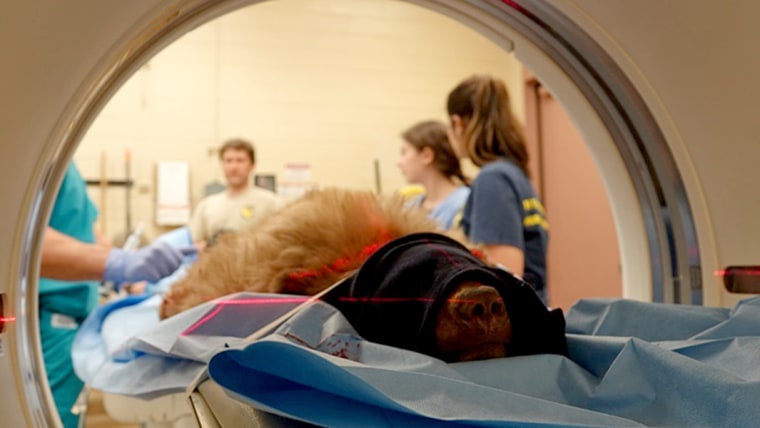In February, the California Department of Fish and Wildlife began getting calls about a small black bear that was showing up in Pollock Pines in El Dorado County, slow to move and with little fear of people.
Yelling and clapping didn't faze the animal. Residents, acting against the guidance of the wildlife agency, started giving the bear water and fruit. At one point, wildlife officials say, the bear "jumped into a housekeeper's open car trunk, prompting attempts to approach it and pet it."

Black bears are normally shy and avoid people unless "they are forced to be around humans to be near a food source," the National Audubon Society says.
When the California agency's biologists began examining the Pollock Pines bear, they declared it to be a bear "too young to be out on its own, 'dog-like' in its behavior, completely comfortable around people."
It weighed only 21 pounds when it was taken to the agency's Wildlife Investigations Laboratory. A similarly aged healthy bear should weigh about 80 pounds, experts say.
At the lab, the bear shook its head intermittently and held it at an angle, the agency said.
After a week of tests, the animal had to be put down. A necropsy confirmed that it had suffered from encephalitis, inflammation of the brain. It's the third bear with such a disorder to show up at the laboratory within the past 12 months, the wildlife department said. Since then, a fourth bear with the same symptoms was euthanized in Humboldt County.
Encephalitis can be caused by viruses, bacteria, fungi or parasites, as well as an auto-immune symptom genetically passed down. Wildlife officials haven't found what is causing the brain swelling in the bears and say they cannot rule out whether affected bears might pose a health risk to other animals.
Jamie Sherman, a veterinarian who studies bear diseases at One Health Institute at the University of California, Davis, said viruses found in some of the affected bears don't threaten humans. If you run into a bear, retreat calmly — and if you discover that a bear has gone through your forest cottage foraging for food, clean it with a 10 percent bleach solution, wearing gloves and a face shield in case you encounter spray-back. If you do see a bear with unusual behavior, the best way to help it is to notify wildlife officials immediately.
Dr. Brandon Munk, a wildlife veterinarian for the wildlife department, said sending the sick bears back into the wild is "just not possible." Zoos and wildlife sanctuaries might find it difficult to care for the animals for the rest of their lives, as they will require "significant medical management," Munk said.
Black bears, which can be found throughout much of North America, are not an endangered species.